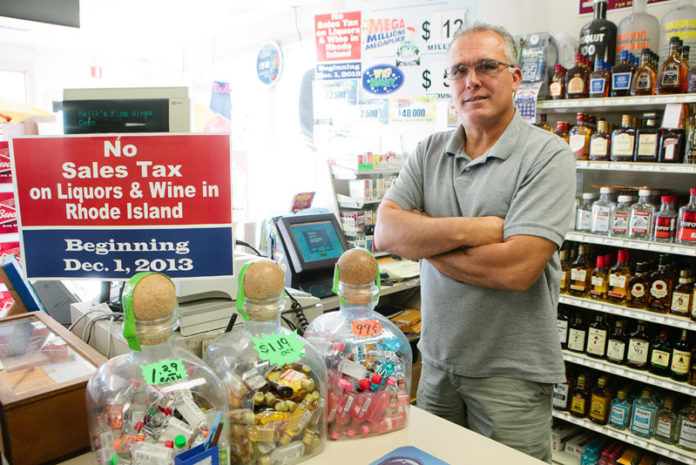
State Rep. Jan Malik, D-Warren, owner of Malik’s Fine Wine & Spirits, says the time has come for his fellow Ocean State businesspeople to speak out against Rhode Island’s sales tax.
Sponsor of a recent bill to eliminate the tax and chairman of a General Assembly study commission on the idea, Malik has scheduled an Oct. 29 hearing specifically to hear what business owners think about it.
“I am hoping the business sector will come out and tell their stories on the sales tax,” Malik said. “They need to speak out. In this state sometimes we take a defeatist attitude that nothing can be done. But we have to be serious about taking Rhode Island beyond where we are at now.”
Since early last month, Malik’s study committee has been hearing testimony and reports on the state sales tax, but it’s unclear exactly how much, if any, traction the effort has gained.
Gov. Lincoln D. Chafee, who has twice previously recommended eliminating sales tax exemptions to broaden the base and raise revenue, left the sales tax as it was in his fiscal 2014 budget proposal.
Chafee spokeswoman Christine Hunsinger said the governor “always looks at every tool” when putting together the budget, but wouldn’t comment on the likelihood of a sales tax proposal in the next budget.
“His interest is in closing a $150 million hole and putting together a balanced budget,” Hunsinger said.
House Speaker Gordon D. Fox said in an email statement he is “impressed with the work of Malik’s commission” and is “open to looking carefully at their ideas, but keeping in mind that the sales tax accounts for nearly $900 million in revenue.”
Malik’s belief that the Rhode Island economy would benefit from ending the 7 percent sales tax was born out of the impact of tax-policy changes on his liquor store, which is not far from the state line in Warren.
When Massachusetts decided to end the sales tax exemption for alcohol sold at liquor stores in 2009, Malik said sales at his store jumped 6 percent.
Then in 2010, Massachusetts voters passed a ballot initiative that brought the exemption back the following year, meaning competitors across the border in Swansea collected no tax while he had to collect 7 percent.
He attributes the greater negative effect of Massachusetts’ repeal to all of the attention and advertising from Bay State stores leading up to and after the vote. In addition, when Massachusetts started taxing alcohol, the tax was still 0.75 percentage points lower than in Rhode Island.
But Malik said this is about much more than liquor.
Since Massachusetts raised the tax on a pack of cigarettes by $1 at the end of July, Malik said he had seen his cigarette sales spike as well.
With so much of Rhode Island’s population living in close proximity to either Massachusetts or Connecticut, Malik believes ditching the sales tax altogether could boost business across retail markets.
But of course, getting rid of the sales tax means finding a way for state government to make up or live without the $887 million in collections now included in the state budget.
The bill Malik sponsored in the spring to get rid of the sales tax, supported by the General Assembly’s Republican caucus, didn’t go anywhere because of those costs.
Leadership instead gave Malik the study commission and the General Assembly passed a temporary sales tax exemption for wine and liquor that goes into effect in December. (The cost of the “pilot” exemption is being made up through higher excise taxes.)
In a study commission hearing at the end of last month, Rhode Island Public Expenditure Council Executive Director John Simmons, who sits on the panel, presented a report comparing Rhode Island’s sales tax and overall revenue structure to other states.
Sales tax was first introduced in Rhode Island in 1947 and reached its current 7 percent in 1990. By fiscal 2011, sales tax collections accounted for 30 percent of total Rhode Island revenue.
Rhode Island’s 7 percent state sales tax rate is the highest in New England – Massachusetts is 6.25 percent and Connecticut 6.35 percent – and tied for second highest in the country with four other states, according to the RIPEC report.
But the Ocean State does not have local-option sales taxes like its neighbors and many other states, making it the 20th-highest combined state and local rate in the country. Tennessee has the highest combined rate at 9.43 percent. California has the highest sales tax rate in the nation at 7.5 percent.
In its report, business-backed RIPEC says keeping multiple revenue sources is a generally positive policy and, as a result, is wary of totally eliminating the sales tax.
“RIPEC believes that it is the state’s overall revenue system – made up of a number of taxes – that requires the attention of the Ocean State’s leaders, those from the public sector as well as the private sector,” the report said. “Changing one tax in isolation may result in unintended consequences for other taxes, and adversely impact both individual taxpayers and the government’s fiscal health.” On the other side, the Rhode Island Center for Freedom and Prosperity, a free-market think tank, issued a report finding that states with no sales tax have higher growth than Rhode Island, which leads to greater state revenue without the need to raise tax rates.
Greater Providence Chamber of Commerce President Laurie White, another member of the study commission, says she would only support lowering the sales tax if it could be done without raising taxes elsewhere or singling out particular industries now exempt.
The Chamber had not supported Chafee’s proposal two years ago to raise $165 million by broadening the sales tax base.
Cranston Mayor Allan Fung, who represented the Rhode Island League of Cities and Towns on the commission until late last month, said in an interview he would support reducing the sales tax, but eliminating it entirely doesn’t seem feasible.
“I would support a reduction in the sales tax to the point where it would make us competitive, especially with bordering states, but not complete elimination,” said Fung, who is mulling a Republican run for governor. “I would like to be able to get below Massachusetts and Connecticut, even if it meant phasing it in. It just depends on the numbers and the amount of revenue we can afford.” •












